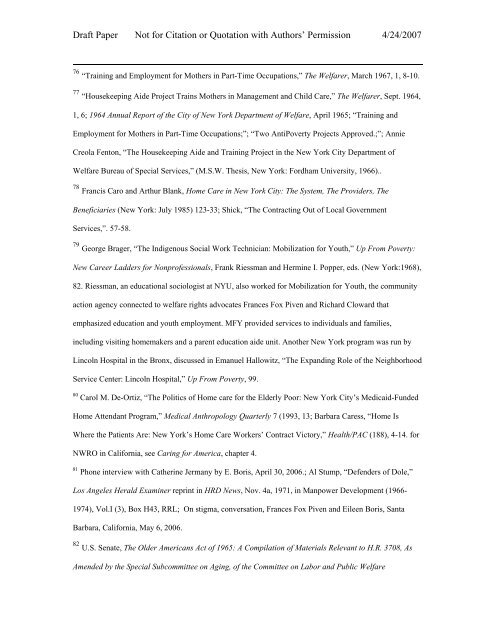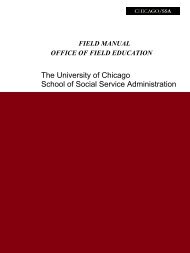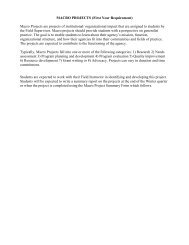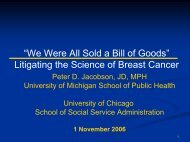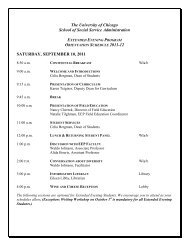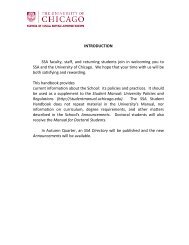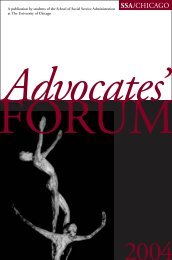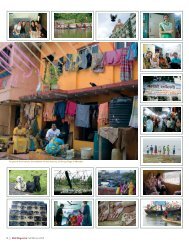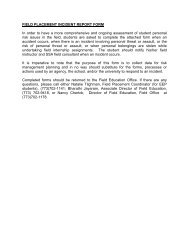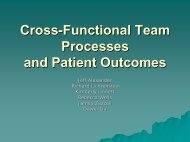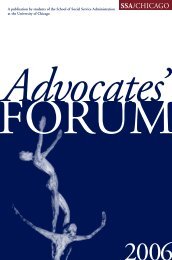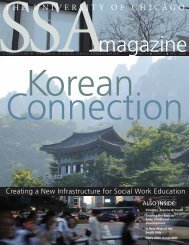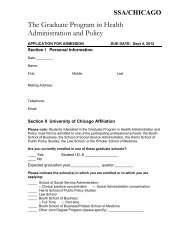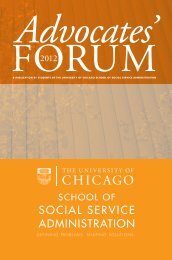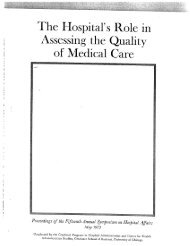Organizing Home Care: - School of Social Service Administration
Organizing Home Care: - School of Social Service Administration
Organizing Home Care: - School of Social Service Administration
Create successful ePaper yourself
Turn your PDF publications into a flip-book with our unique Google optimized e-Paper software.
Draft Paper Not for Citation or Quotation with Authors’ Permission 4/24/2007<br />
76 “Training and Employment for Mothers in Part-Time Occupations,” The Welfarer, March 1967, 1, 8-10.<br />
77 “Housekeeping Aide Project Trains Mothers in Management and Child <strong>Care</strong>,” The Welfarer, Sept. 1964,<br />
1, 6; 1964 Annual Report <strong>of</strong> the City <strong>of</strong> New York Department <strong>of</strong> Welfare, April 1965; “Training and<br />
Employment for Mothers in Part-Time Occupations;”; “Two AntiPoverty Projects Approved.;”; Annie<br />
Creola Fenton, “The Housekeeping Aide and Training Project in the New York City Department <strong>of</strong><br />
Welfare Bureau <strong>of</strong> Special <strong>Service</strong>s,” (M.S.W. Thesis, New York: Fordham University, 1966)..<br />
78 Francis Caro and Arthur Blank, <strong>Home</strong> <strong>Care</strong> in New York City: The System, The Providers, The<br />
Beneficiaries (New York: July 1985) 123-33; Shick, “The Contracting Out <strong>of</strong> Local Government<br />
<strong>Service</strong>s,”. 57-58.<br />
79 George Brager, “The Indigenous <strong>Social</strong> Work Technician: Mobilization for Youth,” Up From Poverty:<br />
New <strong>Care</strong>er Ladders for Nonpr<strong>of</strong>essionals, Frank Riessman and Hermine I. Popper, eds. (New York:1968),<br />
82. Riessman, an educational sociologist at NYU, also worked for Mobilization for Youth, the community<br />
action agency connected to welfare rights advocates Frances Fox Piven and Richard Cloward that<br />
emphasized education and youth employment. MFY provided services to individuals and families,<br />
including visiting homemakers and a parent education aide unit. Another New York program was run by<br />
Lincoln Hospital in the Bronx, discussed in Emanuel Hallowitz, “The Expanding Role <strong>of</strong> the Neighborhood<br />
<strong>Service</strong> Center: Lincoln Hospital,” Up From Poverty, 99.<br />
80 Carol M. De-Ortiz, “The Politics <strong>of</strong> <strong>Home</strong> care for the Elderly Poor: New York City’s Medicaid-Funded<br />
<strong>Home</strong> Attendant Program,” Medical Anthropology Quarterly 7 (1993, 13; Barbara <strong>Care</strong>ss, “<strong>Home</strong> Is<br />
Where the Patients Are: New York’s <strong>Home</strong> <strong>Care</strong> Workers’ Contract Victory,” Health/PAC (188), 4-14. for<br />
NWRO in California, see Caring for America, chapter 4.<br />
81 Phone interview with Catherine Jermany by E. Boris, April 30, 2006.; Al Stump, “Defenders <strong>of</strong> Dole,”<br />
Los Angeles Herald Examiner reprint in HRD News, Nov. 4a, 1971, in Manpower Development (1966-<br />
1974), Vol.I (3), Box H43, RRL; On stigma, conversation, Frances Fox Piven and Eileen Boris, Santa<br />
Barbara, California, May 6, 2006.<br />
82 U.S. Senate, The Older Americans Act <strong>of</strong> 1965: A Compilation <strong>of</strong> Materials Relevant to H.R. 3708, As<br />
Amended by the Special Subcommittee on Aging, <strong>of</strong> the Committee on Labor and Public Welfare


